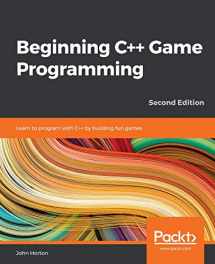
Beginning C++ Game Programming - Second Edition: Learn to program with C++ by building fun games
Book details
Summary
Description
Get to grips with programming techniques and game development using C++ libraries and Visual Studio 2019
Key Features- Learn game development and C++ with a fun, example-driven approach
- Build clones of popular games such as Timberman, Zombie Survival Shooter, a co-op puzzle platformer, and Space Invaders
- Discover tips to expand your finished games by thinking critically, technically, and creatively
The second edition of Beginning C++ Game Programming is updated and improved to include the latest features of Visual Studio 2019, SFML, and modern C++ programming techniques. With this book, you'll get a fun introduction to game programming by building five fully playable games of increasing complexity. You'll learn to build clones of popular games such as Timberman, Pong, a Zombie survival shooter, a coop puzzle platformer and Space Invaders.
The book starts by covering the basics of programming. You'll study key C++ topics, such as object-oriented programming (OOP) and C++ pointers, and get acquainted with the Standard Template Library (STL). The book helps you learn about collision detection techniques and game physics by building a Pong game. As you build games, you'll also learn exciting game programming concepts such as particle effects, directional sound (spatialization), OpenGL programmable shaders, spawning objects, and much more. Finally, you'll explore game design patterns to enhance your C++ game programming skills.
By the end of the book, you'll have gained the knowledge you need to build your own games with exciting features from scratch
What you will learn- Set up your game development project in Visual Studio 2019 and explore C++ libraries such as SFML
- Explore C++ OOP by building a Pong game
- Understand core game concepts such as game animation, game physics, collision detection, scorekeeping, and game sound
- Use classes, inheritance, and references to spawn and control thousands of enemies and shoot rapid-fire machine guns
- Add advanced features to your game using pointers, references, and the STL
- Scale and reuse your game code by learning modern game programming design patterns
This book is perfect for you if you have no C++ programming knowledge, you need a beginner-level refresher course, or you want to learn how to build games or just use games as an engaging way to learn C++. Whether you aspire to publish a game (perhaps on Steam) or just want to impress friends with your creations, you'll find this book useful.
Table of Contents- C++, SFML, Visual Studio. and Starting the First Game
- Variables, Operators, and Decisions ―Animating Sprites
- C++ Strings and SFML Time ― Player Input and HUD
- Loops, Arrays, Switches, Enumerations, and Functions ― Implementing Game I%
- Collisions. Sound, and End Conditions ― Making the Game Playable
- Object-Oriented Programming ― Starting the Pong Game
- Dynamic Collision Detection and Physics ― Finishing the Pong Game
- SFML Views ― Starting the Zombie Shooter Game
- C++ References, Sprite Sheets, and Vertex Arrays
- Pointers, the Standard Template Library, and Texture Management
- Collision Detection, Pickups, and Bullets
- Layering Views and Implementing the HUD
- Sound Effects, File 110, and Finishing the Game
- Abstraction and Code Management ― Making Better Use of 00P
- Advanced OOP ― Inheritance and Polymorphism
- Building Playable Levels and Collision Detection
- Sound Spatialization and the HUD
- Particle Systems and Shaders
(N.B. Please use the Look Inside option to see further chapters)


We would LOVE it if you could help us and other readers by reviewing the book
Book review



